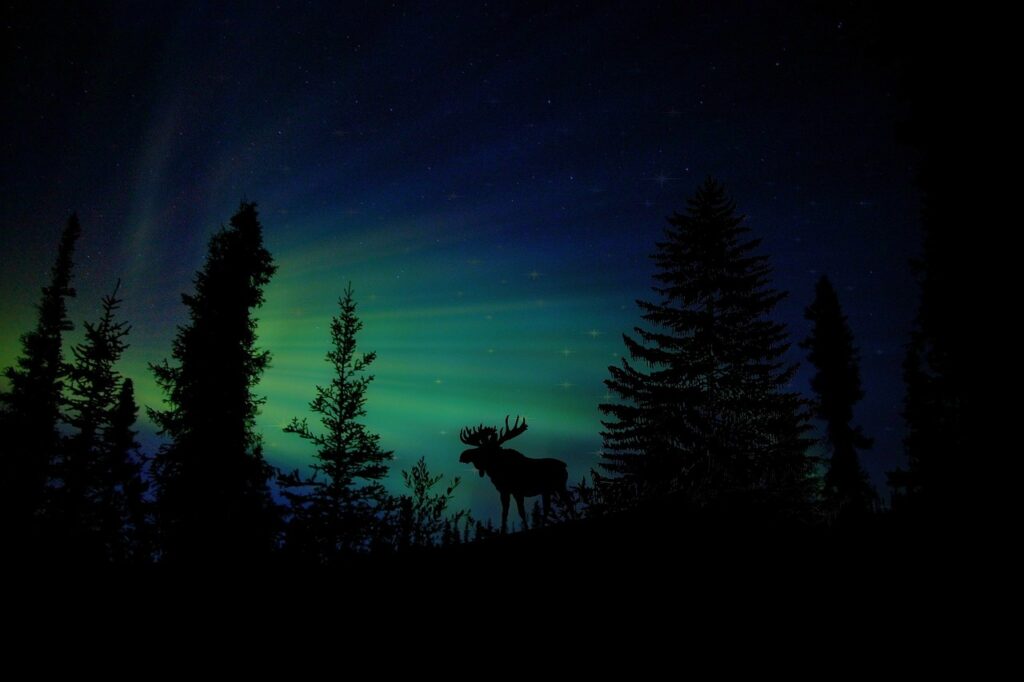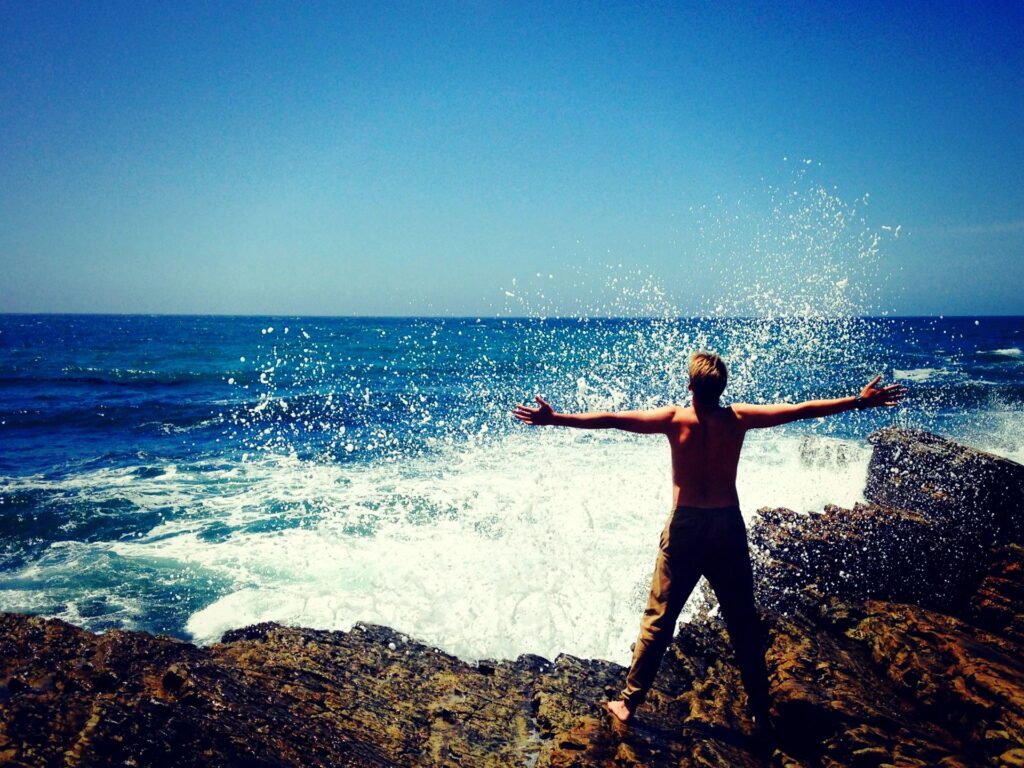Nature O Nature! I do not aspire
To be the highest in thy quire,—
To be a meteor in the sky,
Or comet that may range on high;
Only a zephyr that may blow
Among the reeds by the river low;
Give me thy most privy place
Where to run my airy race.
In some withdrawn, unpublic mead
Let me sigh upon a reed,
Or in the woods, with leafy din,
Whisper the still evening in:
Some still work give me to do,—
Only—be it near to you!
For I’d rather be thy child
And pupil, in the forest wild,
Than be the king of men elsewhere,
And most sovereign slave of care:
To have one moment of thy dawn,
Than share the city’s year forlorn.Henry David Thoreau

Have you ever been alone in nature and experienced a fantastic feeling of euphoria – a larger than you feeling? Perhaps you just had a spiritual encounter with the essence of life. Let’s explore this phenomenon together with a walk in the woods.
To see a World in a Grain of Sand
And a Heaven in a Wild Flower
Hold Infinity in the palm of your hand And Eternity in an hourWilliam Blake
Take a walk with me.
I pick the blueberries and I am struck by the purplish-blue color. Then I see the little green leaves and the brown thin branches. I’m reminded of the myriad of colors I see around me; I notice the roundness of the blueberry and notice the unbroken circle which leads me to ponder infinity – no beginning and no end just continuity.
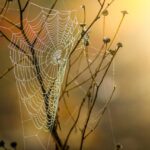 Nested in branches of the blueberry bush I notice an intricate spider web and note its geometry. The spider uses geometry to build its trap for nourishment. The geometry reminds me of the myriads of shapes and intricate patterns found throughout the universe. Geometry is math, the universal language of science used to describe the physical world. This little spider knows the language of the universe in its wispy little legs.
Nested in branches of the blueberry bush I notice an intricate spider web and note its geometry. The spider uses geometry to build its trap for nourishment. The geometry reminds me of the myriads of shapes and intricate patterns found throughout the universe. Geometry is math, the universal language of science used to describe the physical world. This little spider knows the language of the universe in its wispy little legs.
I note in these few examples that there must be an intelligence in the universe to develop such patterns that are beautiful, elegant, efficient, and so life-giving to our physical bodies and our minds. I cannot see this intelligence; I can only witness its majesty – the fruits of its labor.
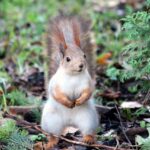 As I continue my walk, I see a squirrel and notice the introduction of behavior to the mix. Some of the behavior of the squirrel is driven by instinct – a voice within that impels the squirrel to build its food stash for Winter. Then some behavior I think is individualized such as scurrying around the tree, jumping from limb to limb, playing with others and noting my presence. It seems as if it does so for the sheer fun of it all. It is an individual with a unique personal drive, too. To what voice is this little squirrel listening? Is there some intelligence orchestrating the movement of seasons and letting the little ones of the forest know what to do and when?
As I continue my walk, I see a squirrel and notice the introduction of behavior to the mix. Some of the behavior of the squirrel is driven by instinct – a voice within that impels the squirrel to build its food stash for Winter. Then some behavior I think is individualized such as scurrying around the tree, jumping from limb to limb, playing with others and noting my presence. It seems as if it does so for the sheer fun of it all. It is an individual with a unique personal drive, too. To what voice is this little squirrel listening? Is there some intelligence orchestrating the movement of seasons and letting the little ones of the forest know what to do and when?
Then I remember that Thoreau said “turn from observation to reverence and gratitude.” I realize how amazed I am at the web of intelligence it took to create the natural world and sustain it. It’s as if there is some force willing the universe to continue to roll forward. I feel the love, I feel the joy. I look within and feel the awe and majesty of the natural world. I move to gratitude for all that I see and even that which I nor anyone else has ever seen – yet!
Spiritual health
An Elon College student reflects that “reflection is crucial to our spiritual health. Nature is associated with improved focus, increased creativity, and higher self- esteem.” In an article named The Connection Between Spirituality and Nature by Shelly Stern we learn that there are at least three benefits to spending time in nature:
It quiets the mind — Nature really helps to clear and quiet the mind. Whether you have been feeling anxious lately or you simply want to meditate more on your spiritual journey, the peaceful calm you get when you are outside among the vegetation and wildlife is so healing.
It provides grounding — If you need a little grounding while on your spiritual journey, you need to go outside and put your feet on the earth. With your bare feet on dirt, grass, or sand, you feel connected with the universe. This can ease stress, anxiety, and fears that might be blocking your spiritual channels.
Nature allows you to tap into your intuition — You might also find that the more time you spend in nature, the more intuitive you become. This is because there is less noise of the city or distractions at home. While you are in nature, things are calm and quiet. You can actually look within and find your natural intuitive instincts and learn how to listen to them.
I have met many Alaskans since moving to Fairbanks in January of this year. Almost every one of them has spoken of their love of outdoors, nature, the wildlife, and the physical beauty of this wild state. Many have expressed their special feelings when they are in nature whether it be for subsistence hunting, fishing, or gathering, mushing their dogs, camping, sightseeing, or just a walk in the woods. There seems to be a universal set of feelings ranging from peacefulness, awe, majesty, excitement, and fulfillment. There is something special going on here. I suggest that there is a presence in nature that calls us to just be with her, share in her bounty, and wonder at her beauty. She speaks to our souls in that quiet voice, in that gentle touch, and that boundless beauty. In some of my quotes is mentioned the word “God.” I invite you to replace the word “God” with whatever word fits your own unique view of a universal intelligence back of all life.
It’s the beauty within us that makes it possible for us to recognize the beauty around us. The question is not what you look at but what you see.
Henry David Thoreau
No reason can be asked or given why the soul seeks beauty. Beauty, in its largest and profoundest sense, is one expression for the universe. God is the all-fair. Truth, and goodness, and beauty, are but different faces of the same...
Ralph Waldo Emerson, Nature
There seems to be a necessity in spirit to manifest itself in material forms; and day and night, river and storm, beast and bird, acid and alkali, preexist in necessary Ideas in the mind of God, and are what they are by virtue of preceding affections, in the world of spirit.
Ralph Waldo Emerson, Nature
The rhythms of life
 The rhythms of life keep us going; moving the universe forward. Nature is full of natural cycles and rhythms. From the long days of summer where the sun barely dips beneath the horizon, to the dark days of Fall and Winter where the sun comes up for only a small set of hours. The change in seasons invite cool crisp air in the Spring, to warmer Summers, the cold of Fall, and the bitter cold of Winter when nature turns into a deep freeze.
The rhythms of life keep us going; moving the universe forward. Nature is full of natural cycles and rhythms. From the long days of summer where the sun barely dips beneath the horizon, to the dark days of Fall and Winter where the sun comes up for only a small set of hours. The change in seasons invite cool crisp air in the Spring, to warmer Summers, the cold of Fall, and the bitter cold of Winter when nature turns into a deep freeze.
There is the migration of the birds and other animals to and from the area. There is the green up in Spring and the changing and falling of the leaves in Autumn. There is the birth of new life in the Spring and kicking the kids out to be on their own later in the season or in coming years. There is the changing sky from bright and blue to cold, darker, rainy and snowy. Life, nature, marches forward in its relentless rhythms and cycles. I suggest that this brings us comfort because we as humans generally like order and reminders of where we are in these cycles.
The Transcendentalists
A group of philosophers and writers called the Transcendentalists taught us about nature. Let us now look at their movement and see what they have to say about spirituality in nature. They capture the true spirit of Alaskans.
Transcendentalism is a philosophical, spiritual, and literary movement that developed in the late 1820s and 1830s in the New England region of the United States. A core belief is in the inherent goodness of people and nature, and while society and its institutions have corrupted the purity of the individual, people are at their best when truly "self-reliant" and independent. Transcendentalists saw divine experience inherent in the everyday, rather than believing in a distant heaven. Transcendentalists saw physical and spiritual phenomena as part of dynamic processes rather than discrete entities.
Wikipedia
Transcendentalism stressed the importance of listening to intuition. The doctrine of the early Unitarian Church closely resembles this philosophy. Individualism and the importance of spiritual self-discovery were stressed by these American philosophers. Some popular women and men of this movement include Margaret Fuller, Ralph Waldo Emerson, Henry David Thoreau, Bronson Alcott, and George Ripley. Later writers and poets followed in their footsteps including Louisa May Alcott and Walt Whitman.
Emerson was a major leader in this movement and had a lot of influence on another philosophical, spiritual movement called New Thought which spawned such churches as the Centers for Spiritual Living, Unity, and others.
Emerson’s first book, Nature, is perhaps the best expression of his Transcendentalism, the belief that everything in our world—even a drop of dew—is a microcosm of the universe. His concept of the Over-Soul—a Supreme Mind that every man and woman share—allowed Transcendentalists to disregard external authority and to rely instead on direct experience.
Wikipedia
Here are some quotes from Emerson’s Nature that demonstrate his ideas about patterns of a spiritual nature. Please excuse the antiquated practice of using only male references.
In the woods, we return to reason and faith. There I feel that nothing can befall me in life, – no disgrace, no calamity, (leaving me my eyes,) which nature cannot repair. Standing on the bare ground, – my head bathed by the blithe air, and uplifted into infinite space, – all mean egotism vanishes. I become a transparent eye-ball; I am nothing; I see all; the currents of the Universal Being circulate through me; I am part or particle of God.
In the presence of nature, a wild delight runs through the man, in spite of real sorrows.
Nature is not fixed but fluid. Spirit alters, moulds, makes it. The immobility or bruteness of nature, is the absence of spirit; to pure spirit, it is fluid, it is volatile, it is obedient. Every spirit builds itself a house; and beyond its house a world; and beyond its world, a heaven. Know then, that the world exists for you. For you is the phenomenon perfect.Ralph Waldo Emerson
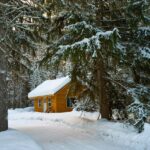 Many of the writings of Emerson and Thoreau speak to us of the spirituality found in nature. His writings on nature inspired both Charles Stearns Wheeler and Henry David Thoreau to isolate, live in nature, and write about their experiences. The best-known work from these experiments was Thoreau’s book Walden about his two-year, two months, and two-day stent at Walden Pond near Concord, Massachusetts. Speaking of this experiment, Thoreau in Walden says:
Many of the writings of Emerson and Thoreau speak to us of the spirituality found in nature. His writings on nature inspired both Charles Stearns Wheeler and Henry David Thoreau to isolate, live in nature, and write about their experiences. The best-known work from these experiments was Thoreau’s book Walden about his two-year, two months, and two-day stent at Walden Pond near Concord, Massachusetts. Speaking of this experiment, Thoreau in Walden says:
I went to the woods because I wished to live deliberately, to front only the essential facts of life, and see if I could not learn what it had to teach, and not, when I came to die, discover that I had not lived.
So, go with me on a walk in the woods and see the patterns and signs of an intelligence buried within nature. Experience your spirituality and connection to a greater existence. Calm your mind and spirit. Experience your uniqueness and belonging to all that is.
We can never have enough of nature. We must be refreshed by the sight of inexhaustible vigor, vast and titanic features, the sea-coast with its wrecks, the wilderness with its living and its decaying trees, the thunder-cloud, and the rain which lasts three weeks and produces freshets. We need to witness our own limits transgressed, and some life pasturing freely where we never wander.
Henry David Thoreau, Walden
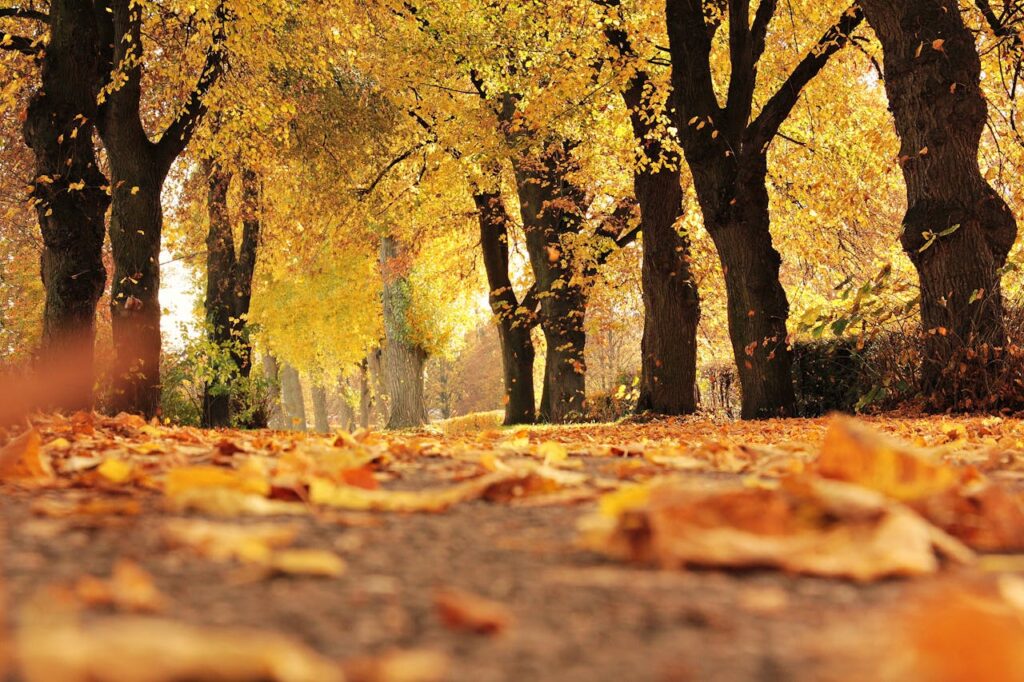
A walk in the woods
Calms my racing thoughts
A breath of fresh air
Pure meditation
Nature is the key
To the soul's locked door
A walk in the woods Let's me breathe again
From the rush of life
A caged freedom
Giving me release
From expectation
A walk in the woods
Brings me to the now
The present moment
A beautiful place
Where my mind finds rest
And my soul finds peaceAllen Steble

